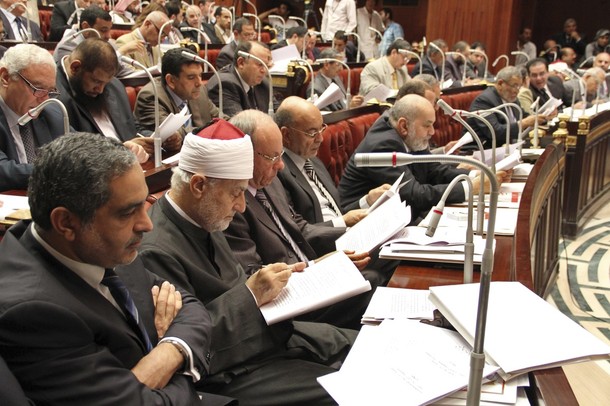
After President Mohammed Morsi took the Supreme Council of the Armed Forces (SCAF) out of the political equation, he and the Islamist political forces assumed the dominant role in Egyptian politics. They also became the next logical target for secular revolutionaries, leftists and liberals alike. Given that Egypt’s transitional timetable and upcoming parliamentary elections – imposed by Islamist President Morsi – depends on the Islamist dominated constituent assembly to complete its work, the recent steps taken by liberal alliances surrounding the constitution marks an escalation challenging this perceived domination and a politicization of the constitutional project.
The newly formed leftist and liberal “super alliance” under the handle of “Egyptian Patriotism” recently united three coalitions to counter Islamist influence. Former presidential hopefuls, Hamdeen Sabbahi, Amr Moussa, Ayman Nour, and Free Egyptians chairman Ahmed Said joined forces threatening to withdraw from the Constituent Assembly unless the government took concrete steps to form a more representative body. The threats come on the heels of Manal al-Tibi’s resignation from the Assembly earlier this week when she published her letter accusing it of serving the singular purpose of reinstating an authoritarian regime with a religious tilt, sidelining suggestions for a more liberal foundation for Egyptian life.
Liberal representatives in the Constituent Assembly have tried this tactic before with mixed results. The first Assembly formed under the auspices of the now dissolved lower house of parliament faced similar walkouts that backed up an administrative court decision to suspend its activity due to its unrepresentative nature. At the time, the Islamist dominated parliament tried to sneak approval of an Islamist-heavy body by the opposition.
The second Assembly saw similar manipulation of its membership and a second round of walkouts that left it in the solid hands of Islamist and Islamist-leaning representatives. However, the SCAF pressure valve in the form of its June constitutional addendum allowing it to dissolve and reconstitute the body (should the Assembly “encounter an obstacle”) tamed the political environment enough for it to proceed. Some speculated that the liberals’ failed attempt to delegitimize the current Assembly by walking out resulted in a missed opportunity to influence the text of the draft constitution, despite the imbalance
Relatively few paid much attention to the implications of President Morsi’s dramatic move ousting the military leadership from the political sphere on the constitutional drafting process. Who could blame them with so many questions surrounding the future military role in Egyptian politics, the legality of Morsi’s August decree, talk of a coup within a coup, and retaliatory actions? Yet, as the first draft of the constitution sees its initial birth pains, we begin to understand the full implications of Morsi’s control over the Constituent Assembly, and why the renewed push for additional walkouts should spark considerable concern.
The liberal and leftist forces’ call for walkouts certainly challenges the current Assembly’s legitimacy, a necessary step in attempting to revamp the unbalanced body. The Egyptian Patriotism super-coalition may even succeed in dislodging a number of unaffiliated members, riding the momentum of the resignation of a respected human rights activist such as Manal al-Tibi. If the walkouts did not suffice to disband the Assembly, a court case considering its dissolution still hangs in the balance, set to resume on October 2. But all the political maneuvering begs the question: to what end?
Under Morsi’s transitional framework, “the president can draw up a new assembly representing the full spectrum of Egyptian society” should the Constituent Assembly encounter problems that “prevent it from doing its duties.” Even if moderates succeed, there is little reason to believe that Morsi would appoint one with a drastically different membership. By politicizing the matter, one could even expect increased polarization along ideological lines, with Morsi siding with the Muslim Brotherhood. Debates that pit the secular against the religious political trends would do more damage to the social fabric at a time when consensus building, cooperation, and compromise are needed most.
Liberals and moderates could not have picked a poorer time to engage in this constitutional battle. In the wake of large protests against the film insulting the Prophet Muhammad, many Egyptians supported Morsi’s critical stance on unrestrained freedom of expression particularly when it came to religious defamation (even if they did not take part in the embassy protests). His public visits courting regional and international support for economic development speak not only to the vast majority of poor and uneducated citizens, but also the businessmen looking for a stronger investment climate. His recent speech at the United Nations General Assembly reiterated his democratic legitimacy and signaled a long standing demand for a foreign policy independent of western influence. Recent data, if it can be believed, also suggests that whatever popularity he and the Muslim Brotherhood lost during their days in parliament fighting the SCAF has since been recovered. Polls claim Morsi’s approval ratings at nearly 80% in support of his policies – eerily similar to the percentage of “yes” votes for the March constitutional referendum and the share of People’s Assembly seats claimed by Islamists.
Despite intense scrutiny and drastic action from opposing political forces, all indications point to a losing battle for non-Islamists. Without a clear alternative legal or constitutional framework to redirect the membership of the Constituent Assembly towards more representative membership, and given President Morsi’s ideological leanings and public popularity, he has no incentive to chart a new course that might change the direction in which the new constitution is headed. Moderates and liberals can only hope that their gambit may buy them enough time to galvanize the support needed to pressure Morsi to go another way. With the political climate apparently in his favor, however, I wouldn’t hold my breath.
Tarek Radwan is associate director for research at the Rafik Hariri Center for the Middle East and a blogger for EgyptSource.
Photo Credit: AP
Image: 610x_97.jpg
